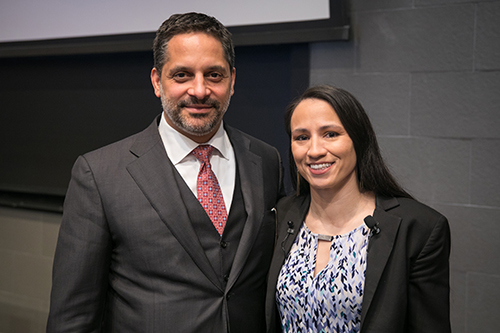This website uses cookies
We use cookies to ensure that we give you the best experience on our website. If you continue to use this site we will assume that you are happy with it.

Dean Eduardo Peñalver and Sharice Davids.
Sharice Davids ’10 had already launched her campaign for a seat in the U.S. House of Representatives when one of her campaign volunteers asked her how many Native American women were in Congress.
A member of the Ho-Chunk Nation, a Native American tribe in Wisconsin, Davids learned that if she were elected, she would become the first Native American woman to serve in the House or Senate. “Once I realized that, the gravity of it kind of sunk in,” she said. “I already was going to work as hard as I possibly could to make this happen, but this definitely makes me proud to be part of this time in history.”
As the keynote speaker at the Women’s Law Coalition’s Career Day, held on March 23, Davids spoke about the challenges of entering a race that includes six other candidates seeking the Democratic nomination for the Third District in Kansas. The winner of the Democratic primary in August, will face off against the incumbent, Republican Rep. Kevin Yoder.
“Sharice is a fighter-I mean that figuratively,” Dean Eduardo M. Peñalver, Allan R. Tessler Dean and Professor of Law, said in introducing her at the luncheon in Myron Taylor Hall. “You see it in her incredible life story. But I also mean it literally.”
As Peñalver pointed out, Davids is a Mixed Martial Arts (MMA) fighter, and while attending Cornell Law School, she would drive to Cortland and Syracuse to train with coaches. Raised by a single mother who was an Army drill sergeant, Davids became a professional MMA fighter and travelled around the country competing in the women’s division.
The skills she learned on the fighting circuit are now helping her in her Congressional campaign. “This is the first time I’ve taken on a fight in which I don’t know what the outcome is going to be,” said Davids, who would become the first openly gay representative from Kansas if elected. “I knew it was going to be hard.”
What has also supported her candidacy is her education at Cornell Law School, which, she said, “definitely gives you a leg up in understanding how policy works, how legislation works, and the interaction between the legislative side and executive side of government.”
After graduating from Cornell Law School, Davids worked as an associate at Sonnenschein Nath & Rosenthal LLP-now called Dentons-in the corporate and Indian law and tribal representation practice groups. While she had once pursued a dream of becoming a corporate attorney working on mergers and acquisitions, she decided to leave the firm after two years and focus on economic development in Native American communities.
In 2012, she moved to the Pine Ridge Indian Reservation in South Dakota, where she developed an entrepreneurial program at a high school and a business incubator for the community. Four years later, she became one of sixteen White House Fellows in the last year of President Obama’s administration and worked in the office of Secretary of Transportation, Anthony R. Foxx.
After the election of President Trump, Davids headed back to Kansas, with the idea of running for Congress. When the Democratic frontrunner left the race last December because of a sexual harassment scandal, Davids declared her candidacy on February 15.
Davids said she wouldn’t have come as far as she did without the people who encouraged her to overcome the obstacles she faced, including her mother and a mentor who encouraged her to apply to Cornell Law School.
“The thing that we should always keep in mind is that our ability to bring others along with us, to help lift others as we climb, is not always going to present itself as this momentous action that we take,” she said. “But rather it’s in small everyday conversations and the small choices and encouragements that we make with each other.”